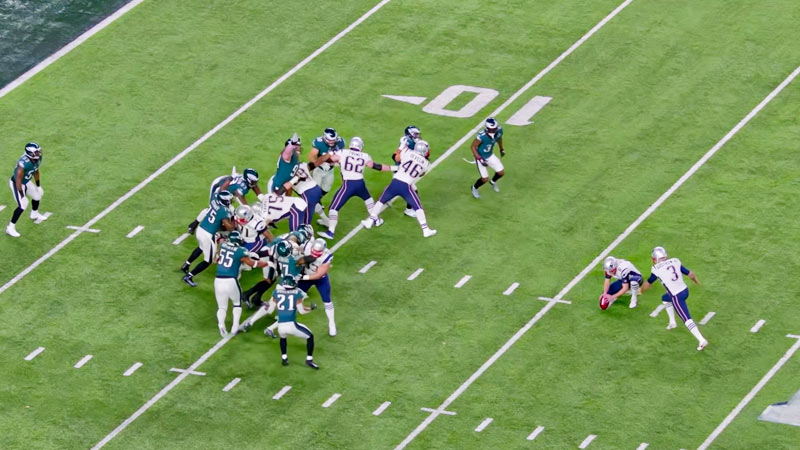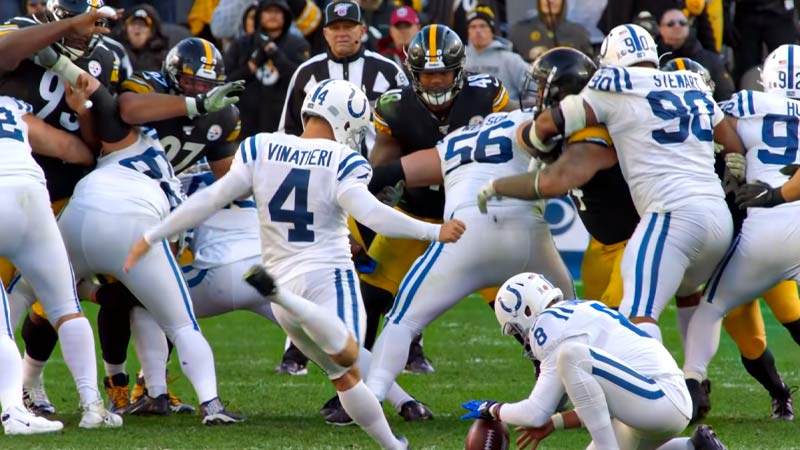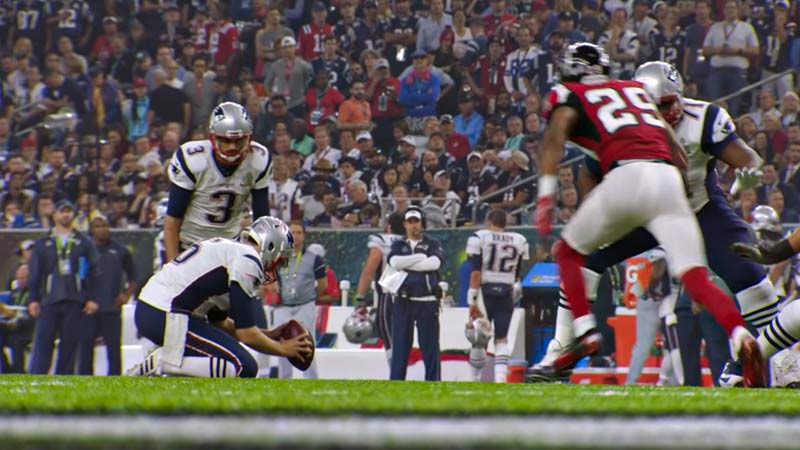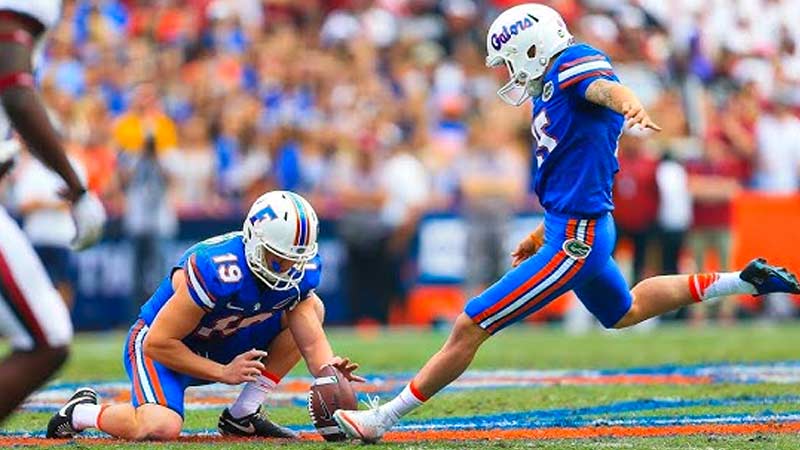When the tension is palpable on the gridiron and the outcome of a game hangs in the balance, there’s a specialist whose role becomes a beacon of hope for the team and a source of excitement for fans – the football placekicker.
Often overshadowed by the glamour of touchdowns and big defensive plays, the placekicker’s contributions are far from minor.
In this blog post, we delve into the world of the football placekicker, uncovering their significance, responsibilities, and the artistry that comes with kicking that seemingly unassuming football.
From crucial game-changing moments to the meticulous training required, let’s explore the facets that make the placekicker a vital player in the realm of American football. Stay focused.
Who Is the Football Placekicker?
The football placekicker is a specialized player on an American football team responsible for executing field goals, extra points, and kickoffs.
Their primary role is to score points by accurately kicking the ball through the opponent’s goalposts. Placekickers possess strong leg strength and accuracy, as their kicks can determine the outcome of games.
Field goals are kicked from various distances on the field and are worth three points, while extra points, attempted after touchdowns, are worth one point. Kickoffs involve launching the ball downfield to initiate the opposing team’s possession.
Successful placekickers combine technique, focus, and nerves of steel to contribute crucial points to their team’s success. They often work closely with holders and long snappers to ensure precise and effective kicks.
Roles and Responsibilities of Football Placekicker

The football placekicker holds a pivotal role within the team, with specific responsibilities that contribute significantly to the team’s success:
Field Goals
The primary responsibility of a placekicker is to attempt field goals. They need to accurately kick the ball through the opponent’s goalposts from various distances on the field, earning the team three points for each successful kick.
Extra Points
After a touchdown, the placekicker attempts an extra point kick. This involves kicking the ball through the goalposts from a shorter distance, earning the team one point if successful.
Kickoffs
Placekickers are tasked with delivering kickoffs at the start of halves, after scores, and to initiate the game. They need to kick the ball deep into the opponent’s territory to minimize the return opportunity and provide their team’s defense with an advantageous field position.
Onside Kicks
In critical situations where a team is trailing and needs to regain possession quickly, placekickers might be called upon to execute onside kicks. These kicks are intended to bounce in a way that allows their own team to recover the ball.
Accuracy and Distance
Placekickers must develop exceptional leg strength and accuracy to consistently make long-distance field goals and maintain a high success rate on extra points.
Pressure Situations
Kicking in crucial moments of the game requires mental fortitude. Placekickers must remain calm under pressure, as their kicks can decide the outcome of the game.
Collaboration
Placekickers work closely with the holder and the long snapper during field goal and extra point attempts. The timing and precision of these interactions are crucial to ensure a smooth kick.
Adaptation to Conditions
Weather and field conditions can affect kicking accuracy. Good placekickers adjust their technique to compensate for adverse conditions.
Physical Fitness
Placekickers need to maintain a level of physical fitness that supports their leg strength and overall performance.
Specialized Training
Placekickers often undergo specialized training to improve their kicking technique, accuracy, and distance capabilities.
Understanding the Game Situation
Successful placekickers have a deep understanding of the game’s flow and strategies. They need to know when to attempt a field goal, an extra point, or an onside kick based on the score and game clock.
Team Support
Beyond their specialized role, placekickers are integral team members who contribute to the overall morale and dynamic of the squad.
Strategies to be a Football Placekicker

Becoming a successful football placekicker requires a combination of physical training, mental preparation, and specialized skill development. Here are strategies to excel in this role:
Master Technique
Focus on mastering proper kicking technique. Work on consistent foot placement, approach, and follow-through. Practice both short and long kicks to develop a versatile skill set.
Strength and Conditioning
Develop leg strength through strength training exercises, such as squats and leg presses. Strong legs are crucial for generating power and distance in your kicks.
Flexibility and Range of Motion
Incorporate stretching and flexibility exercises to ensure a full range of motion in your hips and legs. This flexibility aids in generating maximum power during kicks.
Specialized Coaching
Seek guidance from experienced kicking coaches who can provide personalized feedback on your technique and help you refine your skills.
Consistent Practice
Dedicate time to regular kicking practice. Focus on both accuracy and distance. Repetition is key to building muscle memory and refining your kicking mechanics.
Pressure Situations
Simulate game-like pressure situations during practice. Practice kicking when fatigued to simulate the physical and mental challenges faced during real games.
Visualization
Use visualization techniques to mentally rehearse successful kicks. Imagine yourself executing perfect kicks in various game scenarios.
Mental Resilience
Develop mental resilience to handle pressure situations. Techniques like mindfulness, deep breathing, and positive self-talk can help you stay focused and calm under pressure.
Study Opponents
Analyze opponents’ special teams to identify weaknesses that you can exploit. This can help you strategize your kick placement and adapt your approach accordingly.
Watch Professionals
Study professional placekickers to learn from their techniques and decision-making in different game situations.
Maintain Fitness
In addition to leg strength, maintain overall fitness. Good cardiovascular health contributes to endurance and mental clarity during games.
Team Integration
Build rapport with your holder and long snapper. Smooth communication and timing are crucial for successful field goals and extra points.
Situational Awareness
Understand game situations, including the score, time on the clock, and field conditions. This awareness guides your decisions on when to attempt long kicks, go for field goals, or opt for onside kicks.
Goal Setting
Set specific goals for accuracy, distance, and success rate. Track your progress and adjust your training regimen based on your achievements.
Adaptability
Be prepared to adapt to changing conditions, such as weather or field conditions. Adjust your technique as needed to maintain accuracy.
Significance of a Football Placekicker

A football placekicker holds significant importance within a team, playing a role that goes beyond just kicking the ball through the goalposts. Here are the key aspects highlighting the significance of a football placekicker:
Scoring Points
Placekickers are responsible for earning points for their team through field goals and extra points. Their accurate kicks can turn the tide of a game, making them a crucial asset for securing victories.
Game Deciders
In close matches, a well-executed field goal by the placekicker can determine the outcome of the game. They often find themselves in high-pressure situations with the game on the line.
Field Position Control
Effective kickoffs by the placekicker can help control the opponent’s starting field position, influencing their offensive strategy and potentially leading to defensive advantages.
Momentum Shifts
A successful onside kick or a well-placed kickoff can swing the momentum in favor of the kicking team, providing an opportunity for unexpected possession changes.
Special Teams Impact
Football’s third phase, special teams, involves various crucial elements like field goals, punts, and kickoffs. Placekickers contribute significantly to the success of the special teams unit.
Team Psychology
The confidence a team has in its placekicker affects overall team morale. A reliable placekicker can boost the team’s confidence, knowing they have a dependable option for scoring.
Scoreboard Management
Placekickers play a pivotal role in achieving optimal scoreboard management, ensuring that the team maximizes its point potential by converting field goals and extra points.
Strategy and Decision-Making
Coaches make strategic decisions based on the abilities of their placekickers. Choices regarding whether to attempt a field goal, go for it on fourth down, or kick an onside kick are influenced by the placekicker’s skill set.
Specialized Skill
Kicking a football accurately over a long distance requires a specialized skill that not all players possess. Placekickers showcase a unique set of talents within the team.
Game Clock Management
In the final moments of a game, placekickers’ accuracy and quick execution become paramount for time-sensitive situations like game-winning or game-tying field goal attempts.
Entertainment Value
Long-distance field goal attempts are often crowd-pleasers and add excitement to the game. Fans appreciate the spectacle of a placekicker showcasing their skill with a well-executed kick.
Individual Achievements
Placekickers can earn recognition through individual achievements like setting records for the longest field goals made or having a high field goal percentage.
Team Stability
Having a consistent and reliable placekicker provides the team with a stable scoring option, making it less reliant on risky offensive plays in certain situations.
In essence, a football placekicker’s role extends far beyond the act of kicking a ball. They contribute to a team’s success by scoring points, influencing field position, and impacting game dynamics.
FAQs
What is the role of a football placekicker?
The football placekicker is a specialized player tasked with executing field goals, extra points, and kickoffs. They are responsible for scoring points, controlling field position, and influencing game momentum with their accurate and powerful kicks.
How do placekickers prepare for high-pressure situations?
Placekickers prepare for pressure situations through mental resilience training, visualization techniques, and simulating game-like scenarios in practice. This helps them stay focused and confident when the game is on the line.
What skills are essential for a successful placekicker?
A successful placekicker must possess strong leg strength, accuracy, adaptability to varying field conditions, and effective communication with the holder and long snapper. Mental attributes like confidence and focus also play a vital role.
What impact does a placekicker have on team strategy?
Placekickers influence team strategy by providing coaches with options for scoring points in different situations. Coaches consider their skill set when deciding whether to attempt a field goal, go for a conversion, or attempt an onside kick.
Can a placekicker’s performance make or break a game?
Absolutely. A placekicker’s accurate field goal or extra point can lead to victory, while a missed kick can result in defeat. They often find themselves in game-deciding moments, showcasing the pivotal role they play in a team’s success.
Wrapping Up
As the dust settles on the gridiron, it’s the football placekicker’s contributions that continue to echo through the final score and the memories of fans.
From the thrill of a long-distance field goal splitting the uprights to the strategic decisions made by coaches based on their abilities, placekickers are indelibly woven into the fabric of American football.
Their skill, determination, and nerve in the face of pressure exemplify the essence of sportsmanship and the pursuit of excellence.
So, the next time you witness a placekicker poised to launch the ball through the goalposts, remember the multifaceted role they play in shaping the narrative of the game. Best wishes.







